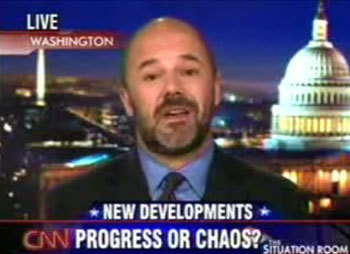Angesichts der regen Beteiligung an der Debatte über Christentum und Christianismus im vorangegangenen Post scheint es mir angebracht, offenzulegen, woher ich den Begriff habe und wie ich ihn verstehe. Ich habe ihn von dem sehr geschätzten Blogger und Essayisten Andrew Sullivan geborgt (ein katholischer, konservativer, schwuler Dissident der Republikaner, anfangs ein Befürworter des Irakkriegs, heute einer der schärfsten Kritiker der Bushies).

Sullivan schreibt in Time Magazine (Mai 2007):
„Are you a Christian who doesn’t feel represented by the religious right? I know the feeling. When the discourse about faith is dominated by political fundamentalists and social conservatives, many others begin to feel as if their religion has been taken away from them….
… There are those who simply believe that, by definition, God is unknowable to our limited, fallible human minds and souls. If God is ultimately unknowable, then how can we be so certain of what God’s real position is on, say, the fate of Terri Schiavo? Or the morality of contraception? Or the role of women? Or the love of a gay couple? Also, faith for many of us is interwoven with doubt, a doubt that can strengthen faith and give it perspective and shadow. That doubt means having great humility in the face of God and an enormous reluctance to impose one’s beliefs, through civil law, on anyone else.
I would say a clear majority of Christians in the U.S. fall into one or many of those camps. Yet the term „people of faith“ has been co-opted almost entirely in our discourse by those who see Christianity as compatible with only one political party, the Republicans, and believe that their religious doctrines should determine public policy for everyone. “ … So Christ is a conservative Republican?
…
What to do about it? The worst response, I think, would be to construct something called the religious left. Many of us who are Christians and not supportive of the religious right are not on the left either. In fact, we are opposed to any politicization of the Gospels by any party, Democratic or Republican, by partisan black churches or partisan white ones. „My kingdom is not of this world,“ Jesus insisted. What part of that do we not understand?
So let me suggest that we take back the word Christian while giving the religious right a new adjective: Christianist. Christianity, in this view, is simply a faith. Christianism is an ideology, politics, an ism. The distinction between Christian and Christianist echoes the distinction we make between Muslim and Islamist. Muslims are those who follow Islam. Islamists are those who want to wield Islam as a political force and conflate state and mosque. Not all Islamists are violent. Only a tiny few are terrorists. And I should underline that the term Christianist is in no way designed to label people on the religious right as favoring any violence at all. I mean merely by the term Christianist the view that religious faith is so important that it must also have a precise political agenda. It is the belief that religion dictates politics and that politics should dictate the laws for everyone, Christian and non-Christian alike.
That’s what I dissent from, and I dissent from it as a Christian. I dissent from the political pollution of sincere, personal faith. I dissent most strongly from the attempt to argue that one party represents God and that the other doesn’t. I dissent from having my faith co-opted and wielded by people whose politics I do not share and whose intolerance I abhor. The word Christian belongs to no political party.“